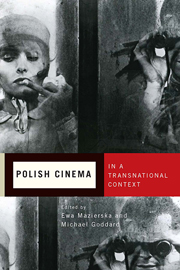Book contents
- Frontmatter
- Contents
- Acknowledgments
- Introduction: Polish Cinema beyond Polish Borders
- Part One The International Reception of Polish Films
- Part Two Polish International Coproductions and Presence in Foreign Films
- 6 Postcolonial Heterotopias: A Paracinematic Reading of Marek Piestrak's Estonian Coproductions
- 7 Poland-Russia: Coproductions, Collaborations, Exchanges
- 8 Train to Hollywood: Polish Actresses in Foreign Films
- 9 Polish Performance in French Space: Jerzy Radziwiłowicz as a Transnational Actor
- 10 Polish Actor-Directors Playing Russians: Skolimowski and Stuhr
- Part Three Émigré and Subversive Polish Directors
- Selected Bibliography
- List of Contributors
- Index
6 - Postcolonial Heterotopias: A Paracinematic Reading of Marek Piestrak's Estonian Coproductions
from Part Two - Polish International Coproductions and Presence in Foreign Films
Published online by Cambridge University Press: 05 April 2014
- Frontmatter
- Contents
- Acknowledgments
- Introduction: Polish Cinema beyond Polish Borders
- Part One The International Reception of Polish Films
- Part Two Polish International Coproductions and Presence in Foreign Films
- 6 Postcolonial Heterotopias: A Paracinematic Reading of Marek Piestrak's Estonian Coproductions
- 7 Poland-Russia: Coproductions, Collaborations, Exchanges
- 8 Train to Hollywood: Polish Actresses in Foreign Films
- 9 Polish Performance in French Space: Jerzy Radziwiłowicz as a Transnational Actor
- 10 Polish Actor-Directors Playing Russians: Skolimowski and Stuhr
- Part Three Émigré and Subversive Polish Directors
- Selected Bibliography
- List of Contributors
- Index
Summary
Although Polish film culture in general was held in high esteem in Soviet Estonia, and many Estonian directors admired the works and successes of their Polish colleagues with a tinge of jealousy, the tangible cinematic link between the two countries, both belonging to the Soviet sphere of influence, was limited. The only Polish-Estonian coproductions were those directed by Marek Piestrak, who made three films in collaboration with Estonian filmmakers: a science fiction film, The Test of Pilot Pirx (Test pilota Pirxa / Navigaator Pirx, 1978); a fantasy adventure, Curse of Snakes Valley (Klątwa Doliny Węży / Madude oru needus, 1988); and, after the collapse of the Soviet Union, a horror/detective film, The Tear of the Prince of Darkness (Łza księcia ciemności / Saatana pisar, 1992). The film “establishments” of both countries, mainly oriented in a highly modernist manner toward auteur cinema, have rather unsurprisingly rejected these and other works by Piestrak, the true enfant terrible of Polish cinema, or the “Ed Wood of Eastern Europe,” preferring to exclude him from the pantheons of their respective national cinemas. The documentation kept in the Estonian State Archives testifies clearly to the fact that the higher ranks of Estonian filmmakers (directors, scriptwriters, cinematographers) regarded the first coproduction (and quite likely also the following collaborations) as a worthless and embarrassing project imposed upon them by the central Russian authorities. Thus only the “secondary” specialists (as well as some local actors and extras) were involved in the actual coproduction process, and quite likely even they considered it hackwork.
- Type
- Chapter
- Information
- Polish Cinema in a Transnational Context , pp. 115 - 133Publisher: Boydell & BrewerPrint publication year: 2014



